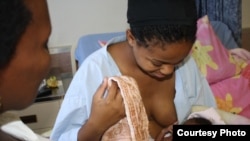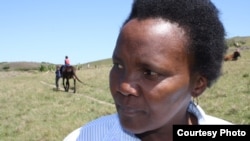This is Part Four of a five-part series on Child Health in South Africa
Continue to Parts: 1 / 2 / 3 / 5
ZIDINDI, SOUTH AFRICA -- For the first time in her life, the usually tenacious and optimistic Ncedisa Paul feels like surrendering.
“I am tired of trying to help those who will not listen to sense. I am up to here,” she said, holding her hand against her forehead, “of trying to save people from themselves.”
In the waiting room of a packed clinic, the frustrated community health worker sighed and said, “Before I started working here, I was the kind of person saying things like, ‘Every dark cloud has a silver lining….’”
But these days, she doubts whether she has any power whatsoever over a storm that in recent years has been steadily building in Zidindi, a deeply impoverished part of South Africa’s Eastern Cape province.
Paul works for an NGO called Philani and provides basic health advice to women and children. She said teen pregnancies are rising dramatically in Zidindi, a district with a population of about 130,000.
The situation here mirrors what’s happening across South Africa, according to health workers and the country’s National Prosecuting Authority (NPA).
In South Africa, it’s illegal for teens younger than 16 to have sex – even if it’s consensual. In August last year, the NPA authorized the prosecution of five teenagers, one of whom was pregnant, for having underage sex.
NPA spokesman Mthunzi Mhaga said at the time, “This problem seems to be continuing unabated as we continue to receive similar cases.”
Unemployment in Zidindi stands at almost 100 percent. Most people live in mud huts and survive by growing their own food. Electricity is almost non-existent. People use the fields, forests and hills as toilets so local water sources are polluted with feces and urine. One in four women is HIV positive. There are few health facilities to serve the vast area, so people struggle to access healthcare. Each year, hundreds of children die of illnesses like diarrhea.
“More than 65 percent of the mothers we deal with in Zidindi are teenagers between 13 and 19 years old. It is common to see 15 year old girls who already have three kids,” said Paul. “But it always shocks me.”
‘They cannot eat words…’
While guiding VOA around the district, the health worker visited a decrepit house. The inhabitants had sold all their possessions. They hadn’t eaten for days. Rain poured in through large cracks in the ceiling, wetting a girl and a baby sleeping on the floor below.
Paul later commented, “The whole family – the mother and three teenaged daughters – is pregnant. The whole family! The mother is giving birth, the daughters also. Two of those daughters are HIV positive. They each have had three kids of their own.”
Wringing her hands in frustration, she added, “I could have told them, ‘Please stop having babies.’ But those babies are going to provide these women with their only income for about the next 20 years. Am I going to provide them with that money every month? No. All I have for them are words and they cannot eat words. So I just kept quiet….”
The South African government gives poor families monthly support grants of the equivalent of about 40 dollars per child younger than 18. Paul says speculation in Zidindi is that the grant money is fueling all the pregnancies in the area.
This is an argument that’s been made repeatedly all over South Africa in recent years. But in 2006 a study by the country’s Human Sciences Research Council (HSRC) concluded that the child support grant has not dramatically increased teen pregnancy since its introduction in 1998. It found, for example, that only 20 percent of teens who bear children actually receive the grant, as most do not have the identity documents necessary to apply for the money.
The research concluded, “There are no grounds to believe that young South African girls are deliberately having children in order to access welfare benefits.”
However, it acknowledged that the issue could only be settled conclusively by a “specially designed” study.
But Paul is insistent that some women who have ID books have as many children as possible simply to increase their grant income.
“When you see and hear what I see every day, this is clear,” she says. “In one family (I know) this woman having eight children. The other one is…pregnant now (with) the tenth one. Then the other one is pregnant (with) the ninth one. That’s the way it is here.”
Drinking dens
Paul did however acknowledge that there are also other complex reasons for all the unplanned pregnancies.
Other than a few barren football fields, there are no forms of recreation for the young people of Zidindi. In addition, shebeens, or informal bars, abound. These provide fertile ground for the exploitation of desperate and bored teenage girls.
“They end up entertaining themselves by drinking in the shebeens and (they) mess around with boys. You can see them sitting around on these high heels with boys,” said Paul.
In a local tavern on a recent Friday night, many of the patrons, and especially the females, were clearly much younger than the legal drinking age of 18. Over quarts of beer and bottles of brandy, rum and whisky, the girls partied with men who were much older.
Surveying the scene, Paul shook her head and commented, “Some of the huts are converted into taverns in these areas. So you’ll find (the girls) there, the whole night, sitting, drinking and dancing. On Fridays, they are not sleeping, leaving their small ones behind with the grannies.”
The National Prosecuting Authority’s Mthunzi Mhaga said alcohol is a “common denominator” in the spate of illegal underage sex in South Africa.
Illegal marriage
Paul said most of the teen mothers her NGO deals with have older boyfriends and husbands, many who work about 1,000 miles away from Zidindi in mines in northern South Africa.
“Those men have money to give to these girls. So they get better things from them, like cellphones, and then they can dress up smartly so that (it) cannot be seen that they are not working. The money also allows them to take better care of their children,” Paul explained.
She said most of the girls in Zidindi drop out of school when they get pregnant. Many get married, she said, adding that marriage symbolizes “great achievement” for local girls.
“They are so confident, telling you that ‘I am a woman now; I am married, you see!’ Some of them are wearing rings, whereas they do not even have a marriage certificate. They have got that status that they are married,” said Paul.
In South Africa it’s also illegal for girls under the age of 16 to marry. But Paul said there’s no enforcement of this law.
“The government knows it’s illegal but no officials ever come here to check things out and the girls carry on getting married. The mothers take their young daughters to marry 30- and 40- and even 50-year-old men, for money, because everyone’s so poor here. It’s poverty that’s driving all of this.”
In fact, Paul said girls barely into puberty compete to see who’ll get married first.
“It’s like a joke and it’s so nice to them to say it out, proudly, ‘I’m going to be married to a 30-year-old boy and he’s mine!’”
But it’s not a joke. The NGO worker pointed out that the next she hears about the girls is that they’ve been infected with HIV by their husbands, who usually have many other sexual partners elsewhere.
No sex education
Paul insisted that there’s “purposeful ignorance” of contraception in the Zidindi district. “There are free condoms at the clinics but no one uses them. The girls are scared the men will leave them if they insist to use condoms. The men say you don’t eat sweets with the papers on….”
She said parents do not talk about sex with their children. “When you’re talking about even contraceptives, (the parents) say, ‘Oh, not in front of me, oh, not in front of me.’”
Paul said she’s confronted with intense resistance when trying to give sex education in the district. “I try to talk about sex with the youngsters here; it’s no good, because of the parents and the grandparents. They block me. I will ask a 15-year-old girl who I know is having sex for her family planning card. Then the mother will intervene, screaming, ‘Hayi! (No!) Don’t come here to my house and talk about such things! Get out!’”
According to Paul, an attitude of “simply ignoring that something bad is happening” has long fueled teen pregnancies in areas like Zidindi.
It’s a conspiracy of ignorance that she once fought to defeat with furious “shouts and screams.”
These days, however, she feels as if she’s merely adding to the weight of silence around the issue. “I am losing my voice,” she acknowledged, while dejectedly ambling away from yet another counseling session.







